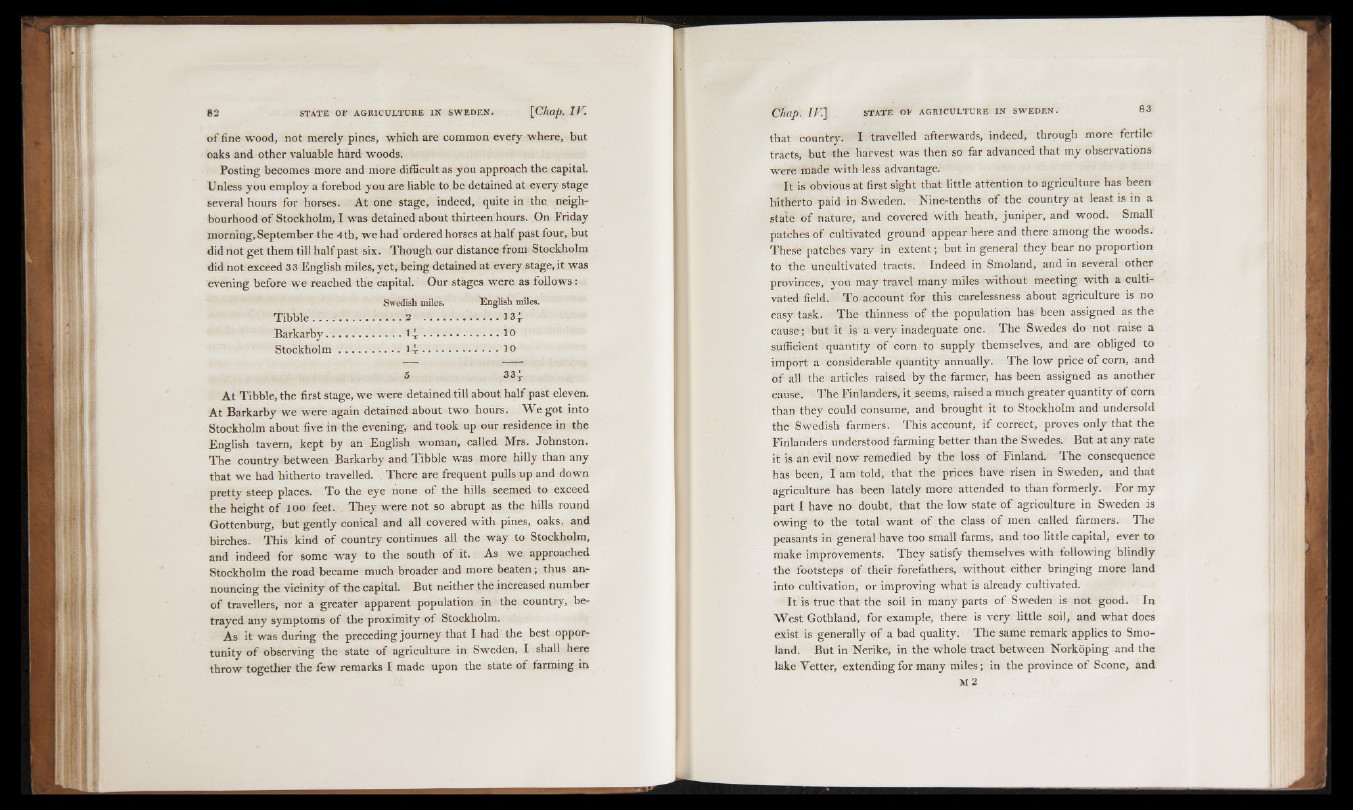
o f fine wood, not merely pines, which are common every where, but
oaks and other valuable hard woods.
Posting becomes more and more difficult as you approach the capital.
Unless you employ a forebod you are liable to be detained at every stage
several hours for horses. At one stage, indeed, quite in the neighbourhood
o f Stockholm, I was detained about thirteen hours. On Friday
morning, September the 4th, we had ordered horses at half past four, but
did not get them till half past six. Though our distance from Stockholm
did not exceed 33 English miles, yet, being detained at every stage, it was
evening before we reached the capital. Our stages were as follows:
Swedisk miles. English miles.
T i b b i e . . . . . . . . . . 2 ............. .......... 134-
Barkarby........................ 1 4 ■ • * ..................... 10
Stockholm.................... 1 4 ...................... 10
5 334
A t Tibbie, the first stage, we were detained till about half past eleven.
At Barkarby we were again detained about two hours. We got into
Stockholm about five in the evening, and took up our residence in the
English tavern, kept by an English woman, called Mrs. Johnston.
The country between Barkarby and Tibbie was more hilly than any
that we had hitherto travelled. There are frequent pulls up and down
pretty steep places. To the eye none of the hills seemed to exceed
the height o f 100 feet. They were not so abrupt as the hills round
Gottenburg, but gently conical and all covered with pines, oaks, and
birches. This kind of country continues all the way to Stockholm,
and indeed for some way to the south o f it. As we approached
Stockholm the road became much broader and more beaten; thus announcing
the vicinity o f the capital. But neither the increased number
o f travellers, nor a greater apparent population in the country, betrayed
any symptoms o f the proximity o f Stockholm.
As it was during the preceding journey that I had the best opportunity
o f observing the state of agriculture in Sweden, I shall here
throw together the few remarks I made upon the state of farming in
that country. I travelled afterwards, indeed, through more fertile
tracts, but the harvest was then so far advanced that my observations
were made with less advantage.
It is obvious at first sight that little attention to agriculture has been
hitherto paid in Sweden. Nine-tenths of the country at least is in a
state of nature, and covered with heath, juniper, and wood. Small
patches of cultivated ground appear here and there among the woods.
These patches vary in extent; but in general they bear no proportion
to the uncultivated tracts. Indeed in Smoland, and in several other
provinces, you may travel many miles without meeting with a cultivated
field. To account for this carelessness about'agriculture is no
easy task. The thinness of the population has been assigned as the
cause; but it is a very inadequate one. The Swedes do not raise a
sufficient quantity o f corn to supply themselves, and are obliged to
import a considerable quantity annually. The low price o f corn, and
of all the articles raised by the farmer, has been assigned as another
cause. The Finlanders, it seems, raised a much greater quantity o f com
than they could consume, and brought it to Stockholm and undersold
the Swedish farmers. This account, i f correct, proves only that the
Finlanders understood farming better than the Swedes. But at any rate
it is an evil now remedied by the loss o f Finland. The consequence
has been, I am told, that the prices have risen in Sweden, and that
agriculture has been lately more attended to than formerly. For my
part I have no doubt, that the low state o f agriculture in Sweden is
owing to the total want of the class o f men called farmers. The
peasants in general have too small farms, and too little capital, ever to
make improvements. They satisfy themselves with following blindly
the footsteps of their forefathers, without either bringing more land
into cultivation, or improving what is already cultivated.
It is true that the soil in many parts o f Sweden is not good. In
West Gothland, for example, there is very little soil, and what does
exist is generally o f a bad quality. The same remark applies to Smoland.
But in Nerike, in the whole tract between Norkoping and the
lake Vetter, extending for many miles; in the province of Scone, and
m 2